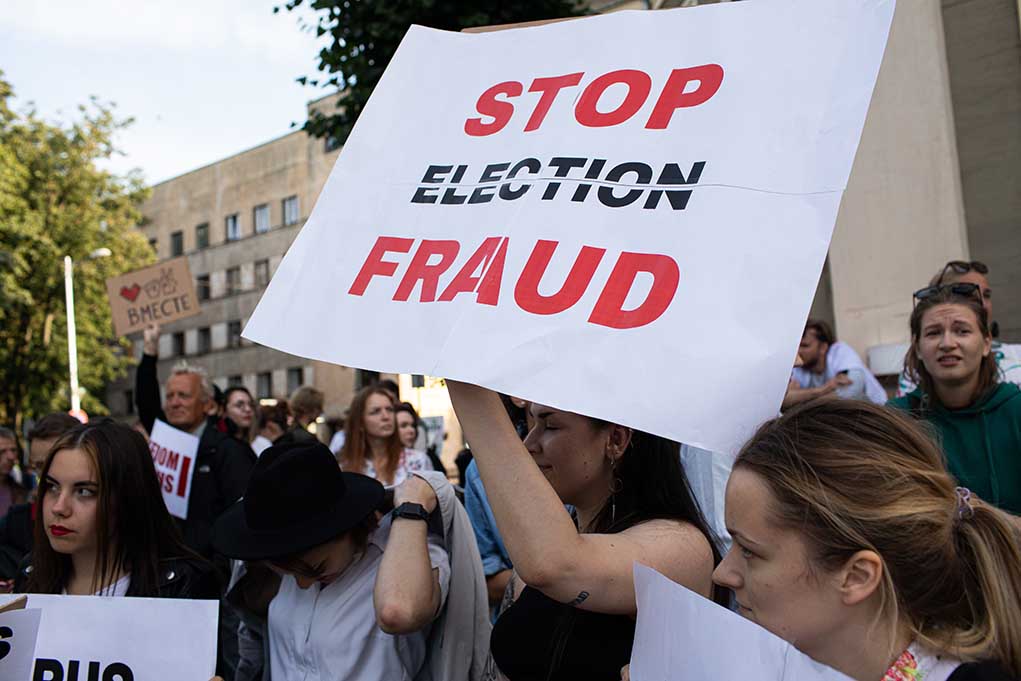
A 69-year-old former Colorado clerk received a nine-year prison sentence for election security breaches, sparking nationwide outrage and a direct intervention from President Trump.
Key Takeaways
- Former Mesa County Clerk Tina Peters was sentenced to nine years for allowing unauthorized access to election systems in 2021
- President Donald Trump has publicly demanded her release, calling her a “political prisoner”
- Critics point to sentencing disparities compared to actual voter fraud cases in Colorado
- Colorado Secretary of State Jena Griswold defends the sentence, stating Peters compromised election security
- The case has intensified debate about justice system fairness and election integrity concerns
Trump Demands Release of Former Colorado Clerk
President Donald Trump has publicly called for the immediate release of Tina Peters, a former Mesa County clerk now serving a nine-year prison sentence for allowing unauthorized access to Colorado’s election systems in 2021. Peters, 69, became a prominent figure in election denial movements following the 2020 presidential election. Her conviction on multiple charges, including attempting to influence a public official and official misconduct, has drawn significant attention from conservative figures who question the severity of her punishment.
Trump took to social media with a direct message: “FREE TINA PETERS, NOW!” His intervention escalated the case to national prominence, with the president characterizing Peters as a victim of political persecution. Trump has further directed his criticism at Colorado Attorney General Phil Weiser, accusing him of pursuing Peters while ignoring more serious crimes allegedly committed by illegal immigrants in the state.
🚨BREAKING: President Trump directs the DOJ to free Gold Star mother Tina Peters from Colorado prison. pic.twitter.com/ycR8mpZDBw
— Benny Johnson (@bennyjohnson) May 6, 2025
Questions of Sentencing Disparities
Critics of Peters’ sentence have highlighted what they see as troubling inconsistencies in Colorado’s judicial system. They point to the case of a man convicted of actual voter fraud in Colorado who reportedly received a significantly lighter sentence. This disparity has fueled concerns about potentially uneven application of justice, particularly in cases with political dimensions related to election security or integrity questions.
Peters’ supporters have begun lobbying Colorado Governor Jared Polis for clemency, though no formal application has yet been submitted. Meanwhile, the Department of Justice has filed a court brief that could potentially aid Peters’ case, but Colorado state attorneys have requested its dismissal, maintaining that the prosecution was appropriate and justified.
Colorado Officials Defend Sentence
Colorado Secretary of State Jena Griswold has firmly defended the sentence, arguing that Peters’ actions directly compromised electoral security. According to court records, Peters allowed unauthorized individuals to access Mesa County’s election systems, resulting in the leak of sensitive election data. Judge Matthew Barrett, who presided over the case, criticized Peters during sentencing for showing no remorse and abusing her position of public trust.
“Tina Peters is a criminal who compromised her own voting equipment to try to prove Trump’s Big Lie. Trump is weaponizing the Department of Justice. We cannot allow him to rewrite history or use his lies to create two tiers of justice for the American people,” said Griswold.
Broader Implications for Election Integrity Debates
The Peters case occurs against the backdrop of ongoing national debates about election security, with state audits confirming the accuracy of Colorado’s 2020 election results despite continued questions from some quarters. Peters is currently serving her sentence at La Vista Correctional Facility, with her situation increasingly becoming a flashpoint in discussions about election administration, justice system fairness, and political divisions in an increasingly Democratic-leaning Colorado.
Trump’s characterization of Peters as “an innocent Political Prisoner being horribly and unjustly punished” reflects the deep ideological divides surrounding election security measures and enforcement actions. The case continues to draw attention from both supporters who view her as a whistleblower and critics who maintain she deliberately compromised critical election infrastructure for political purposes.















